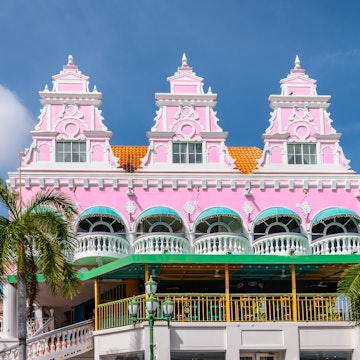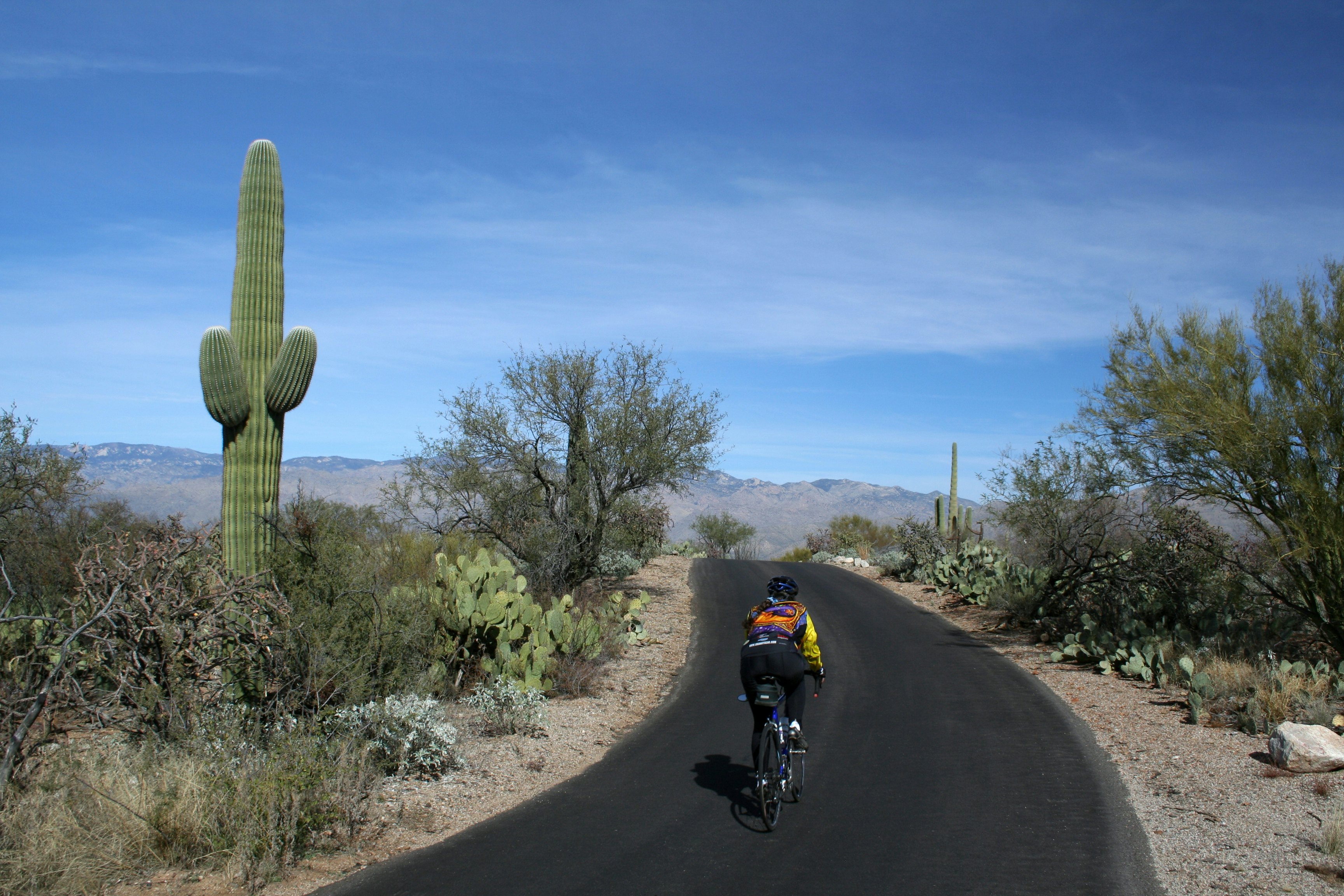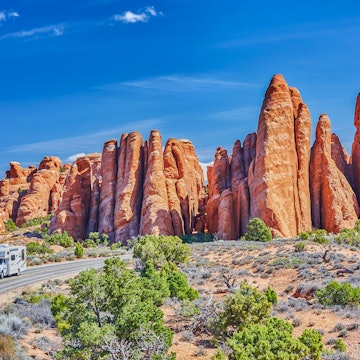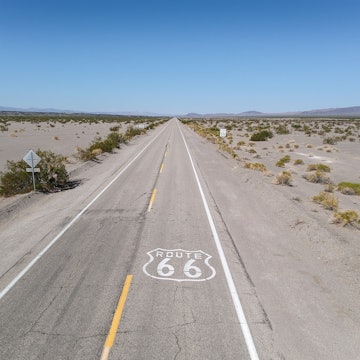

Get to know Saguaro National Park, a testament to the remarkable resilience of desert life. Shutterstock
Set on the outskirts of Tucson, Arizona, Saguaro National Park invites visitors to drink up the rugged beauty and charm of the Sonoran Desert. Home to the towering saguaro cactus – the largest cactus in North America – the park is a testament to the remarkable resilience of desert life.
Expansive mountain landscapes and iconic cacti as far as the eyes can see set the stage for an unforgettable experience. If you’re lucky, you may even spot the rare and mysterious crested saguaro. Remember to watch your step – prickly cacti don’t mess around. Here’s your guide to making the most of a visit to Saguaro National Park.
When should I go to Saguaro National Park?
Summer at Saguaro National Park can be hot – like, really hot. Temperatures often climb above 100°F. Then, there’s monsoon season, which can run from mid-June through September. Early morning and late evening explorations are your best bets for exploring the park in the summer months.
For more comfortable temps, aim for early spring (March and April) or late fall (October and November). These seasons offer mild weather, with temperatures ranging from the high 50°Fs to the low 80°Fs. Spring in particular is a wonderful time to see wildflowers, chollas and saguaro cacti in bloom.

How much time should I spend in Saguaro National Park?
At 92,000 acres, Saguaro National Park is among the smallest national parks in the United States. Uniquely, this park is split into two distinct units on either side of Tucson. To the west, you’ll find the Tucson Mountain District, where the Red Hills Visitor Center is located. On the east side, the Rincon Mountain District is home to the Rincon Mountain Visitor Center.
The Tucson Mountain District tends to be the more popular of the two, thanks to its dense forest of tree-like saguaro cacti. You could easily explore this area in half a day by watching the park’s film, checking off a couple of short hikes and motoring along the six-mile Scenic Bajada Loop Drive.
Is it easy to get in and around Saguaro National Park?
Saguaro National Park is easy to reach and explore, but you will need your own wheels since there is no shuttle service in the park. From downtown Tucson, it’s a 30–40-minute drive to either of the park’s two districts. Flying in? Tucson International Airport is 20 minutes away from downtown and receives direct flights from 19 US cities, including Chicago, Seattle and Salt Lake City.
There are no drive-in campgrounds inside the park, but adventurous backpackers can camp in the Saguaro Wilderness Area in the Rincon Mountain District at one of six hike-in backcountry sites. Note that you’ll need to get a permit online at Recreation.gov. There are nearby private campgrounds, too, like the Tucson/Lazydays KOA Resort.
Tucson itself has plenty of hotels and Airbnbs to fit any budget, which is good to know since you won’t find any lodging inside the park. As a heads up – you also won’t find any gas stations or restaurants within the park either, so stock up and gas up before you go.

Top things to do in Saguaro National Park
Explore the Signal Hill Petroglyphs
Take a step back in time at Signal Hill in the west district, where you can see ancient petroglyphs carved centuries ago by the Hohokam people. A short hiking trail leads from the Signal Hill picnic area to a hilltop with more than 200 prehistoric rock carvings. It’s a great spot to soak up history and desert views, especially at sunset when deep oranges and fiery reds take over the sky.
Enjoy a scenic drive
Both districts of Saguaro National Park offer scenic driving loops that showcase the park’s beauty. The popular 6-mile Scenic Bajada Loop Drive in the Tucson Mountain District winds through a dense forest of saguaro cacti. On the east side, the 8-mile Cactus Forest Drive is a one-way, paved road that skirts along the foothills of the Rincon Mountains. Both drives reward visitors with easy access to trailheads, picnic areas and breathtaking landscapes.
Hike the Valley View Trail
The Valley View Trail is an easy 0.8-mile round-trip hike that meanders through towering saguaros, some reaching more than 70ft tall. The park is home to 28 different species of cactus, including prickly pear and teddy bear cholla, which you may also spy along this trail. It ends at a bench with big views across the valley, where cacti blanket the landscape for miles.
Catch a sunset at Gates Pass
Gates Pass is the spot for a dramatic sunset show across the Tucson Mountains. As the sun dips below the horizon, you’ll be treated to a sky that bursts with dramatic colors, casting shadows over the saguaro cacti. Arrive early – at least 30 to 60 minutes before sunset, especially on weekends – because it can get crowded and parking is limited.

Attend a dark sky event
Saguaro National Park is an official Urban Night Sky Place, offering some of the clearest and most dazzling night skies. It’s a prime spot to see constellations, planets and even the Milky Way. Head to popular areas like Signal Hill and Javelina Rocks for incredible views, but check the moon phase ahead of time (a new moon is best for optimal stargazing). The park also hosts night sky programs, like star parties and moonlit night hikes.
My favorite thing to do in Saguaro National Park
One of my favorite spots at Saguaro National Park isn’t technically inside the park, but it’s a must-visit: the Arizona-Sonora Desert Museum. This 98-acre outdoor museum is next door to the west district, and it’s an oasis with walking trails, a free-flight aviary, an art gallery, an aquarium and an animal theater. My favorite part, however, is the Cactus Garden. You won’t believe how many types of cactus are here, from cholla to prickly pear to Mexican lime barrel. Since opening in 1965, the garden has grown to feature more than 135 cacti species.
How much money do I need for Saguaro National Park?
A visit to Saguaro National Park is pretty wallet-friendly. The entrance fee is $25 per vehicle, which gives you access to both park districts and is good for seven days, so there's no need to cram it all into one day. Just remember, this park does not accept cash. Here's a quick look at what you can expect to spend in Tucson during your visit, though prices may fluctuate with the season:
Budget hotel: $75–100
Luxury hotel: $250–400
Simple dinner (for two): $45–60
Gasoline (per gallon): $3–3.75
Can I bring my dog?
Dogs are welcome at Saguaro National Park, but they’re limited to park roads, parking areas, picnic areas and three hiking trails. In the Tucson Mountain District, the Desert Discovery Trail is a short, paved loop that’s a good choice for active pups. Over in the Rincon Mountain District, both the Mica View Trail and Desert Ecology Trail are scenic options for dogs in need of a stroll. Remember to keep your dog on a leash and bring plenty of water to keep your pet hydrated.

Can I bring my bicycle?
Tucson is a bike-friendly destination, and Saguaro National Park is no exception. In the Rincon Mountain District, the 8-mile Cactus Forest Drive is a scenic, paved route perfect for cycling, but note that it’s shared with cars and pedestrians. If you’re into mountain biking, check out the Cactus Forest and Hope Camp Trails on the east side.
Over in the Tucson Mountain District, the 6-mile Scenic Bajada Loop Drive welcomes cyclists, but be prepared for gravel. While the offshoot trails are off-limits for bikes, the Golden Gate Trail is a wide gravel path for cyclists. Just make sure your ride has wide tires for traction and control.
Does the park offer ranger-led programs?
Saguaro National Park offers ranger-led programs in both districts to help visitors get to know the park’s wildlife, history and desert ecology. While ranger programs run year-round, you’ll find a solid schedule from January to April. Two popular programs include “Living with Giants,” a 45-minute talk about the park’s famous saguaro cacti at the Red Hills Visitor Center and “Garden Walk,” a 30-minute stroll through the cactus garden at the Rincon Mountain Visitor Center.
Bonus tips for first-time visitors
Wildlife spotting: Keep your eyes peeled for native wildlife like roadrunners, jackrabbits and Gila monsters, but always maintain a safe distance.
Chase the sunset: The saguaro cacti cast stunning silhouettes at sunset, so get to prime viewing spots like Gates Pass or Valley View Overlook early. And don’t rush off once the sun sets – the cacti look magical under the moonlight.
Cactus blooms: For a real treat, visit in spring to see the saguaro cactus in bloom. Its white flowers open up at night and fade by midday, so time your visit to catch the show.
Stay hydrated: The desert heat can be intense, especially in the summer, so above all, make sure to pack plenty of water, particularly if you’re planning to hike.
















